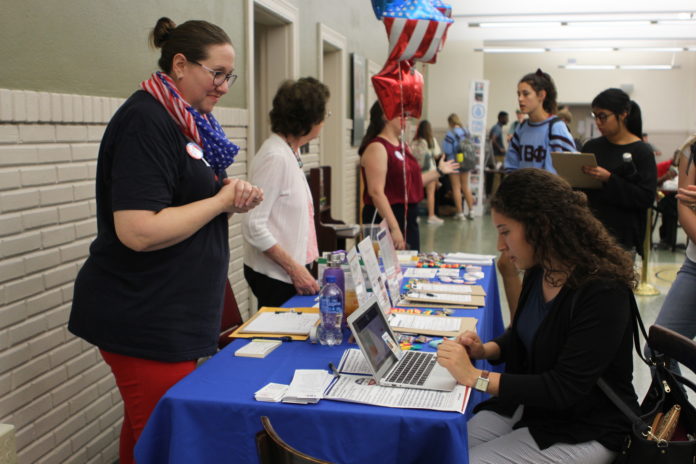By Sarah Pinkerton | Staff Writer
With the appearance of COVID-19, the economy has shifted within recent months, presenting a new topic on the debate stage between President Donald Trump and Democratic candidate and former Vice President Joe Biden.
As the COVID-19 death tolls in the United States reaches over 211,000, the debate over the pace of government reopening efforts remains key for the 2020 presidential election, an element that did not exist during the 2016 presidential election.
Supporting unemployed Americans, aiding with small business recovery, debt forgiveness, health care and taxes are believed to be some of the main focuses of this year’s election.
In June, Ari Shapiro, host of NPR’s news show “All Things Considered,” said The National Bureau of Economic Research announced that the U.S. economy was in a recession.
Scott Horsley of NPR then defined recession as “a sustained period of economic contraction.”
According to Horsley, COVID-19 shutdowns led to a loss of over 20 million jobs which caused a growth in unemployment and a fall in GDP.
After temporary business closures, an article on Investopedia said that after experiencing success in February, the U.S. stock market was pushed into “bear market” territory, a term that defines a market’s experience of prolonged price declines.
“While the market regained much of those losses, unemployment remains high and GDP growth looks like it will be severely impacted across the globe,” the article said.
Dr. David VanHoose, Herman W. Lay professor of enterprise in the economics department, said that if you had asked economists in March about what they had anticipated, they would have said a V-shaped recovery.
“The anticipated short lockdowns in most states that would be followed by a speedy recovery once the lockdowns ended,” VanHoose said.
The threat of a W-shaped double dip recession, as economists call it, a recession after a short-lived recovery period, looms. VanHoose added that given how long the shutdowns lasted, he feels the economy seems to be doing better than he had anticipated.
“In many states, people are back to work and getting their jobs done to a much greater extent,” VanHoose said.
He said that based on economic activity alone, Trump was the favorite for the upcoming election until COVID-19 hit.
“He is opposed to many of the lockdowns that have gone on in many of the states,” VanHoose said. “It’s hard for me, and I think for hard for anybody else, to judge who’s going to hold who responsible for what’s happened to the economy.”
He said that up until the recession, the economy was growing at about 2% a year.
Dr. Patrick Flavin, associate professor of political science, said that while the U.S. economic state is improving, the pace of the improvement is slow.
“We lost millions of jobs in springtime and then things started to come back, but the pace of that recovery, which I think is concerning, has started to slow,” Flavin said. “If it’s going to have any effect on the election in terms of how people vote, I think it’ll be the pace at which things are getting better is what people will be looking at.”
Flavin also said while economic stability and the election have had a strong relationship for decades, this year has many differences.
“Mainly because it’s not clear that voters primarily hold just President Trump and the Republicans responsible,” Flavin said. “But also, people interpret economic news through their partisanship.”
He also said that incumbent presidents often get reelected.
“They really are likely to get reelected if the economy’s doing well,” Flavin said. “I think it would be fair to say that had COVID never happened, the president would probably be more likely to get reelected than things stand now where most polling data shows him trailing Biden.”
Both the Republican and Democratic party have different plans for combating the recession caused by COVID-19.
Trump pushes towards a greater re-opening effort to assist with the economy and made the decision this week to end discussion on another COVID stimulus package until after the election.
“I have instructed my representatives to stop negotiating until after the election when, immediately after I win, we will pass a major Stimulus Bill that focuses on hardworking Americans and Small Business,” Trump said in a tweet on Tuesday.
Biden favors stricter reopening efforts to combat the spread of COVID-19 and greater monetary assistance from the government to those in need.
In an eight-part plan laid out on his website, Biden states that in addition to other things, he will “ensure paid leave for all workers who get sick with COVID-19, for as long as they need to recover and complete quarantine – leave paid for by the federal government with a guarantee that workers can return to their jobs.”
In addition, the winner of the next election will play a part in appointing individuals to two empty spaces in the Federal Reserve which will have an impact on monetary policy for many years.
The article in Investopedia emphasizes that in addition to the COVID recession, student debt concerns, climate change policy, trade with foreign nations — particularly China — housing, healthcare, investing, taxes and technology remain issues of debate as well, just as previous years.
VanHoose said the economic viewpoints on both sides have become polarized, so independents will have the ball in their court on Nov. 3.
“I think that they’re going to appeal to those clumps on either side,” VanHoose said. “And it really will be these people in the middle and so in that sense the Median Voters Theory still has something going for it. The people in the middle will decide this thing.”






